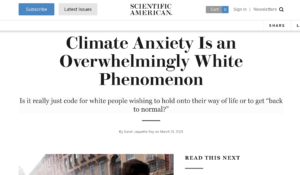https://www.scientificamerican.com/article/the-unbearable-whiteness-of-climate-anxiety/
Is it really just code for white people wishing to hold onto their way of life or to get “back to normal?”

By Sarah Jaquette Ray (Sarah Jaquette Ray, Ph.D., is professor and chair in the Environmental Studies Department at Humboldt State University.)
The climate movement is ascendant, and it has become common to see climate change as a social justice issue. Climate change and its effects—pandemics, pollution, natural disasters—are not universally or uniformly felt: the people and communities suffering most are disproportionately Black, Indigenous and people of color. It is no surprise then that U.S. surveys show that these are the communities most concerned about climate change.
One year ago, I published a book called A Field Guide to Climate Anxiety. Since its publication, I have been struck by the fact that those responding to the concept of climate anxiety are overwhelmingly white. Indeed, these climate anxiety circles are even whiter than the environmental circles I’ve been in for decades. Today, a year into the pandemic, after the murder of George Floyd and the protests that followed, and the attack on the U.S. Capitol, I am deeply concerned about the racial implications of climate anxiety. If people of color are more concerned about climate change than white people, why is the interest in climate anxiety so white? Is climate anxiety a form of white fragility or even racial anxiety? Put another way, is climate anxiety just code for white people wishing to hold onto their way of life or get “back to normal,” to the comforts of their privilege?
The white response to climate change is literally suffocating to people of color. Climate anxiety can operate like white fragility, sucking up all the oxygen in the room and devoting resources toward appeasing the dominant group. As climate refugees are framed as a climate security threat, will the climate-anxious recognize their role in displacing people from around the globe? Will they be able to see their own fates tied to the fates of the dispossessed? Or will they hoard resources, limit the rights of the most affected and seek to save only their own, deluded that this xenophobic strategy will save them? How can we make sure that climate anxiety is harnessed for climate justice?
My book has connected me to a growing community focused on the emotional dimensions of climate change. As writer Britt Wray puts it, emotions like mourning, anger, dread and anxiety are “merely a sign of our attachment to the world.” Paradoxically, though, anxiety about environmental crisis can create apathy, inaction and burnout. Anxiety may be a rational response to the world that climate models predict, but it is unsustainable.
And climate panic can be as dangerous as it is galvanizing. Dealing with feelings of climate anxiety will require the existential tools I provided in A Field Guide to Climate Anxiety, but it will also require careful attention to extremism and climate zealotry. We can’t fight climate change with more racism. Climate anxiety must be directed toward addressing the ways that racism manifests as environmental trauma and vice versa—how environmentalism manifests as racialized violence. We need to channel grief toward collective liberation.
The prospect of an unlivable future has always shaped the emotional terrain for Black and brown people, whether that terrain is racism or climate change. Climate change compounds existing structures of injustice, and those structures exacerbate climate change. Exhaustion, anger, hope—the effects of oppression and resistance are not unique to this climate moment. What is unique is that people who had been insulated from oppression are now waking up to the prospect of their own unlivable future.
It is a surprisingly short step from “chronic fear of environmental doom,” as the American Psychological Association defines ecoanxiety, to xenophobia and fascism. Racism is not an accidental byproduct of environmentalism; it has been a constant reference point. As I wrote about in my first book, The Ecological Other, early environmentalists in the U.S. were anti-immigrant eugenicists whose ideas were later adopted by Nazis to implement their “blood and soil” ideology. In a recent, dramatic example, the gunman of the 2019 El Paso shooting was motivated by despair about the ecological fate of the planet: “My whole life I have been preparing for a future that currently doesn’t exist.” Intense emotions mobilize people, but not always for the good of all life on this planet.
Today’s progressives espouse climate change as the “greatest existential threat of our time,” a claim that ignores people who have been experiencing existential threats for much longer. Slavery, colonialism, ongoing police brutality—we can’t neglect history to save the future.
RESILIENCE AND RELATION AS RESISTANCE
I recently gave a college lecture about climate anxiety. One of the students e-mailed me to say she was so distressed that she’d be willing to submit to a green dictator if they would address climate change. Young people know the stakes, but they are not learning how to cope with the intensity of their dread. It would be tragic and dangerous if this generation of climate advocates becomes willing to sacrifice democracy and human rights in the name of climate change.
Oppressed and marginalized people have developed traditions of resilience out of necessity. Black, feminist and Indigenous leaders have painstakingly cultivated resilience over the long arc of the fight for justice. They know that protecting joy and hope is the ultimate resistance to domination. Persistence is nonnegotiable when your mental, physical and reproductive health are on the line.

Sign up for Scientific American’s free newsletters.
Instead of asking “What can I do to stop feeling so anxious?”, “What can I do to save the planet?” and “What hope is there?”, people with privilege can be asking “Who am I?” and “How am I connected to all of this?” The answers reveal that we are deeply interconnected with the well-being of others on this planet, and that there are traditions of environmental stewardship that can be guides for where we need to go from here.


